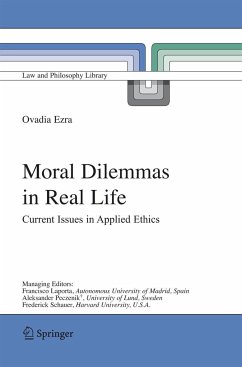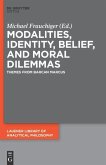Moral Dilemmas in Real Life purports to supply ways of thinking of, perhaps even dealing with, the ins and outs of ethical argument. The world today presents both individuals and communities with situations, which demand moral and ethical deliberations. From the more general issues of universal globalization to the very specific problems of every-day existence encountered by active agents, contemporary life is replete with moral and ethical conundrums. Any thinking person is required, so it seems, to be concerned, involved, or - at the very least - conversant with these issues and this book supplies the wherewithal needed.
Applied ethics is that intellectual locale where theory meets praxis. Moral Dilemmas in Real Life is designed to make that meeting point explicit, by presenting a series of issues in well-grounded philosophical formulations.
The book begins with the general relation between the individual and society - instilling ethical tension, and even clashes, between the private and the public in our discourse. Going on, from general to specific, it gradually narrows the ethical playing field to touch on medical ethics, the family, and the practice of punishment. In all cases, the book addresses both consensual and conventional social institutions and distortions thereof.
Hinweis: Dieser Artikel kann nur an eine deutsche Lieferadresse ausgeliefert werden.
Applied ethics is that intellectual locale where theory meets praxis. Moral Dilemmas in Real Life is designed to make that meeting point explicit, by presenting a series of issues in well-grounded philosophical formulations.
The book begins with the general relation between the individual and society - instilling ethical tension, and even clashes, between the private and the public in our discourse. Going on, from general to specific, it gradually narrows the ethical playing field to touch on medical ethics, the family, and the practice of punishment. In all cases, the book addresses both consensual and conventional social institutions and distortions thereof.
Hinweis: Dieser Artikel kann nur an eine deutsche Lieferadresse ausgeliefert werden.
Review by Albert D. Spalding, JD on Jan 30th 2007 Metapscychology Volume: 11, Number: 5 "Technological advances and cultural anomie are among the forces have combined to make moral discourse more difficult, more complex, and more elusive than ever before. Technology has impacted the relationships between individual and society, individuals and each other, and the entire spectrum of what it means to be human. While individuals seek to assert their autonomy and independence, nearly everything they do in public (and often what they do in private) is subject to some form of data capture, surveillance, or monitoring. Within a culture that values personal expression, human progress, and self esteem, human embryos are treated as laboratory artifacts, and babies are commoditized. As moral relativism takes hold across multiple institutions and societal structures, the idea of punishment--indeed, the idea of crime--has become problematic. Many writers and thinkers have added their voices to a cacophony of monologues that is sometimes misunderstood to be some form of moral discourse. Much of what is proffered is held out as some fresh insight or some clever analysis, but in reality consists of little more than separate streams of unwarranted opinions and emotivist blatherings. Occasionally an ethicist will make specific ethical claims, will support such claims with evidence and argument, and it will map such claims to one or more ethical theories in a way that makes sense. Meanwhile, there are many books in print dedicated to moral issues. Many of them consist of anthologies of excerpts from the writings of moral philosophers, political commentators, and ethicists. Some are themed (medical ethics, professional ethics, business ethics, etc.), and many are targeted for use in specific college courses in philosophy, psychology, or other undergraduate or graduate ethics-related courses. Ovadia Ezra neither offers a polemic on moral issues, nor presents a collection of snippets from the writings of moral philosophers. Instead, in Moral Dilemmas in Real Life, Ezra dives directly into specific social and ethical issues, outlines the moral parameters and essential questions that are highlighted by such issues, makes recommendations regarding the moral theories and ethical epistemologies that are likely to offer helpful insights in each case, and charges the reader with the responsibility of completing the analysis and are arriving at practical conclusions. In so doing, Ezra draws from a rich supply of philosophers, ethicists, jurists, and social scientists (whose works, in turn, are referenced in several hundred footnotes). One of the issues addressed by Ezra is the right of privacy. The author draws from legal precepts, virtue theory, and the insights of various social philosophers in an effort to show the nuances and limitations of the concept. Several specific circumstances, w








